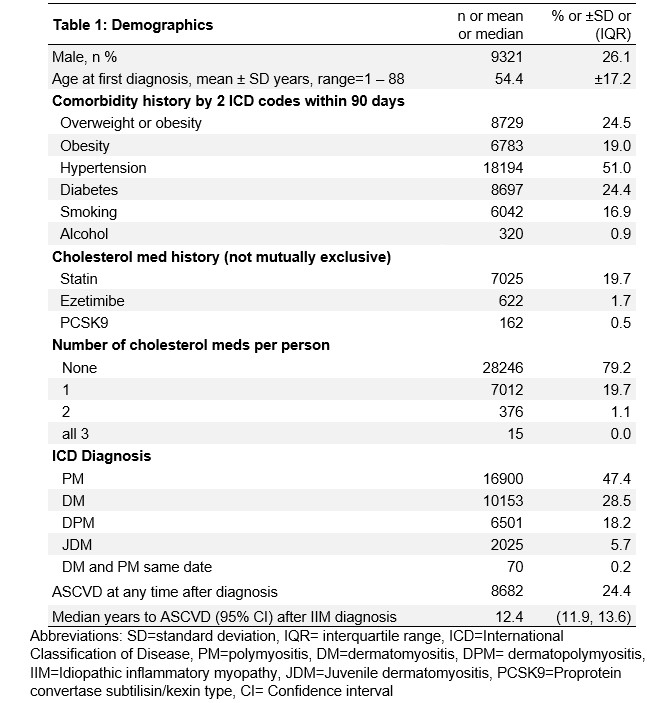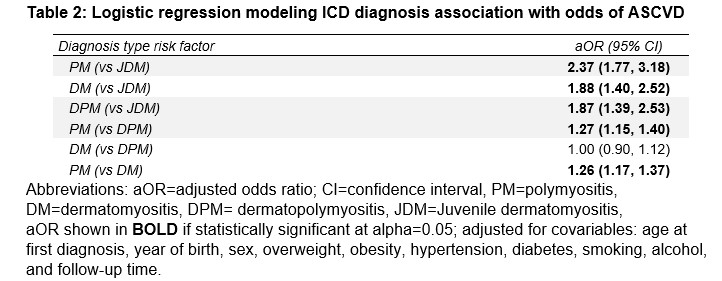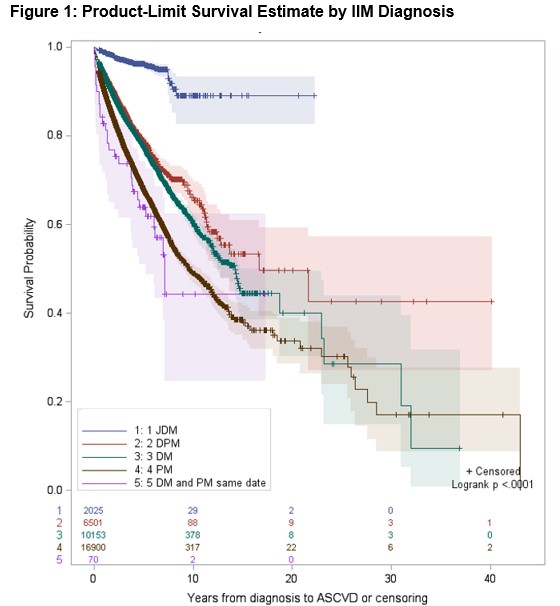Session Information
Date: Wednesday, November 15, 2023
Title: Abstracts: Muscle Biology, Myositis & Myopathies – Basic & Clinical Science II
Session Type: Abstract Session
Session Time: 9:00AM-10:30AM
Background/Purpose: Idiopathic inflammatory myopathies confer an increased risk of morbidity from cardiovascular disease. Prior work has noted more than double risk of cardiovascular events for patients with dermatomyositis (DM) and polymyositis (PM) when compared to the general population. Furthermore, in a single center study of patients with DM, one-fifth of hospitalizations were associated with an atherosclerotic cardiovascular (ASCVD) diagnosis or procedure. We investigated the incidence of new-onset ASCVD after International Classification of Disease (ICD) diagnosis code of DM, PM, dermatopolymyositis (DPM) or juvenile dermatomyositis (JDM).
Methods: This retrospective analysis used the TriNetX database, a national federated research network of de-identified data enrolling over 150 million patients. Patients were identified by entry of two ICD codes separated by at least 6 months, according to their first diagnosis code (i.e., DM, PM, DPM, or JDM). Patients with an ASCVD code that preceded the diagnosis code were excluded as we wanted to capture a new ASCVD event. We defined an ASCVD event as an ICD code entry for myocardial infarction, ischemic stroke, transient ischemic attack or peripheral arterial disease. Logistic regression modeling the odds of ASCVD outcome were used to produce adjusted odds ratios (OR) and 95% confidence intervals (95% CI) for differences among diagnosis codes.
Results: A total of 35,649 patients were identified, of whom 26% were male and the mean age at first IIM diagnosis code was 54 (table 1). In the sample, half of the patients had hypertension. The majority of patients (79%) were not on a cholesterol medication, and 20% had a prior dispensation for a statin medication. The ASCVD outcome occurred in 30% of patients with PM, 24% in patients with DM, 15% of patients with DPM and 4% of patients with JDM. The median time to ASCVD event was 9.7 years for PM, 14.2 years for DM, and 16.7 years for DPM (Figure 1). There were higher odds of ASCVD outcome for all PM, DM, DPM patients compared to JDM (table 2). Compared to DM, patients with PM had 26% higher odds of ASCVD (table 2).
Conclusion: ASCVD is an important comorbidity that affects patients with IIM. Given the median time to event of 12 years, it appears to be a long-term complication after myositis diagnosis in patients who do not have concomitant ASCVD. This study also highlights the need for further evaluation into the use of the DPM code which represents a subset of patients seen in the US who have a longer time to ASCVD event compared to patients with ICD codes for DM or PM. Future study should investigate the shorter time-to-event observed in PM than other IIM. Additional study should evaluate whether special screening or intervention are necessary to reduce risk for ASCVD in IIM.
To cite this abstract in AMA style:
Allenzara A, Alvarez C, Nelson A, Foulke G. Frequency of Atherosclerotic Cardiovascular Disease Following a Diagnosis of Idiopathic Inflammatory Myopathy: Data from a Large National Registry [abstract]. Arthritis Rheumatol. 2023; 75 (suppl 9). https://acrabstracts.org/abstract/frequency-of-atherosclerotic-cardiovascular-disease-following-a-diagnosis-of-idiopathic-inflammatory-myopathy-data-from-a-large-national-registry/. Accessed .« Back to ACR Convergence 2023
ACR Meeting Abstracts - https://acrabstracts.org/abstract/frequency-of-atherosclerotic-cardiovascular-disease-following-a-diagnosis-of-idiopathic-inflammatory-myopathy-data-from-a-large-national-registry/



